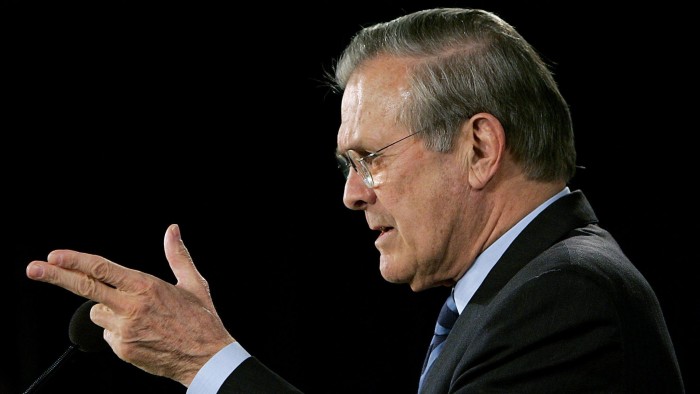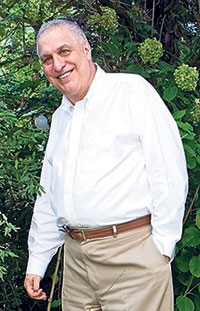Errol Morris’s Donald Rumsfeld documentary

Simply sign up to the Life & Arts myFT Digest -- delivered directly to your inbox.
For a good documentarist, truth is always stranger than fiction. Fictional events have templates and precedents: the events and experiences that inspired the storyteller. Reality comes out of a clear blue sky. Who on earth could invent Donald Rumsfeld?
“There’s a kind of madness at the heart of it,” Errol Morris says of the personality – the cerebral, complex, notionally controlling personality – of the politician he portrays in his latest film, The Unknown Known . Like Morris’s The Fog of War (2003), this is the docu-portrait of a US defence secretary. Like Robert McNamara, Donald Rumsfeld conducted an ill-fated military campaign in Asia. “I sometimes joke it’s a matched set of salt and pepper shakers,” Morris says. “They’re the two most famous or, if you would, infamous, defence secretaries of the past 50 years. They both presided over disastrous wars, McNamara Vietnam, Rumsfeld Iraq and Afghanistan. For that reason alone, Rumsfeld seemed an obvious choice.”

Morris is at pains, though, to point out the difference between the films.
“Did you see Tabloid?” he asks. I am sitting in a Mediterranean hotel with the white-shirted, whiteish-haired director, now of slightly enriched girth, whom I first met 35 years ago as a whippersnapper auteur of eccentric observational docs (Gates of Heaven, 1978, about a pet cemetery; Vernon, Florida, 1981, about a quirky small town and its citizens). Tabloid (2010), harking back to that earlier style, was Morris’s fact-is-crazier-than-fiction story of Joyce McKinney, a former Miss Wyoming who kidnapped and sexually assaulted a Mormon missionary man.
“The Unknown Known is more in that tradition,” says Morris. “People say: ‘Is this Fog of War 2?’ I say: ‘No, it’s Tabloid 2’. It’s about a character who’s really lost inside himself, to the extent he no longer sees the world clearly. I see Rumsfeld as a man lost in a sea of words.”
It was the tens of thousands of memos written by George W Bush’s defence secretary that first intrigued Morris. “Unlike McNamara, who had no notion even that his ideas and conversations were being recorded [by President Johnson on his pre-Nixon tape recorder], Rumsfeld was attempting to write history before as well as after it happened. The memos are designed not just to create policy but to define events. They give you not just what he thinks but what he wants other people to think. They’re a strange hall of mirrors that endlessly fascinated me.”
Out of these memos, and the defence secretary’s sometimes barely less prolix and mandarin press conferences, came the phrase that inspired Morris’s title: part of a Rumsfeld discursion about “known knowns”, “known unknowns” and “unknown knowns”. In some sequences of the film, an animated graphic depicts a literal, surging ocean of words.
“He’s trying to control the uncontrollable. The war in Iraq is slipping away, the insurgency is raging out of control and he’s in the Pentagon dictionary foraging for some way to redefine everything so he’ll be convinced, and we, that we’re winning the war, not losing it.”
The Unknown Known gives its interviewee enough film footage to hang himself. That’s the advantageous side of a contract deal with Rumsfeld that forbade Morris to interview anyone else. But the politician – wily, squinty-eyed and, even when trapped by a question, either affably skilled at escape or daffily logorrhoeic with deflections – doesn’t get hanged. I push the film-maker. Shouldn’t he have pushed Rumsfeld more? Perhaps to an admission of failure? Even to a Frost/Nixon moment of apology?
Morris moves in his chair. You can’t quite call it wriggling. More shaping the exact, punctilious position from which to respond. “What’s interesting to me is that there is no Frost/Nixon moment in Frost/Nixon. Except maybe in the Ron Howard movie. We need – and I think it’s built into the programme of Homo sapiens – this idea of confrontation and redemption. It becomes a kind of passion play. The Fog of War was criticised because McNamara never said, ‘I’m sorry’. But I pointed out again and again that my desire to hear him say ‘I’m sorry’ was absolutely nil. I’m a Jew from Long Island, not a Catholic priest hearing confession.
“With Rumsfeld the frightening thing is that there’s a kind of crazy sincerity. He is a believer. So if that’s the story, my playing a version of David Frost is stupid. It’s irrelevant.”
I put provocation number two, then. Was Rumsfeld really Morris’s first choice for profiling as a Bush-era practiser of black arts? Surely a documentarist would go for the meatier choice of Dick Cheney? Higher up the political food chain, and a man who overtook his own one-time master, Rumsfeld, to become the nation’s heartbeat-away ruler in the wings. (With a dicky heart for added plot drama.)
“I think both men are high up the food chain. Both men have plenty of questions to answer. It’s a fascinating story because these two guys ran the world twice. Maybe neither got to be president of the US but both served what I’d consider weak presidents. Unelected presidents.” In the mid-1970s Rumsfeld was defence secretary and Cheney chief of staff under Gerald Ford, the vice-president who had stepped into the presidency on Nixon’s resignation. “George W Bush was unelected in his first term …”
“Or elected by the Supreme Court,” I chip in. “Yes. Not by the popular vote,” says Morris. “So the two men did the same thing twice, 30 years apart. In round two of this boxing match with history, Rumsfeld marginalised the State Department and National Security Council. He controlled, in those first four Bush years, the apparatus of government.”
Morris has great eloquence on the Rumsfeld career. Perhaps too much. Isn’t there a danger that he and his film will be seen as helping the Rummy legacy rather than questioning or critiquing it?
“‘Helping’ is an odd notion, as if I’m some kind of Bush administration social worker,” he says. “I would say it’s neither helping or hurting. I’ve often said that what’s most appealing about documentary is you get to reinvent it every time you make a film. If you’re gonna do the same thing over and over, why bother?
“I like to think I’ve created new forms of non-fiction over the years. That’s what I’d like to continue to do. So I think there’s a deeper premise, or I hope so, than helping or hurting.”
Ambivalence about Rumsfeld is, indeed, sometimes a virtue in the film. Morris has a clear take on his subject’s lack of clarity. There is a mad Borgesian maze taking shape or being built around this man, possibly by the man himself. When “maze” won’t quite do as a visual metaphor, Morris brings in others, from that literalised “sea of words” to the twice-used aerial travelling shot of a swamp land. First deployed as a visual comment when Rumsfeld himself uses the word “swamp”, of the Iraq campaign, it is redeployed sardonically when he says that many of his policy decisions have justified themselves by surviving into the Obama era.
“The suspension of civil liberties, the use of military tribunals, the people incarcerated in Guantánamo without hope! He’s using it as his supreme justification. But it is a swamp. A swampland is the appropriate image,” says Morris.
Perhaps Morris is right to let us clamour on with our complaints that Rumsfeld has been let off the hook. Perhaps the director is looking to respond that these men are never hooked anyway. They, or their like, always escape back into the rivers and seas. To do more harm. To provoke more questions. And to inspire more documentaries that can ask, simply, complexly and honourably, why the world – the governed world – isn’t better than it is.
‘The Unknown Known’ is released in the UK on March 21 and in the US on April 2
Comments